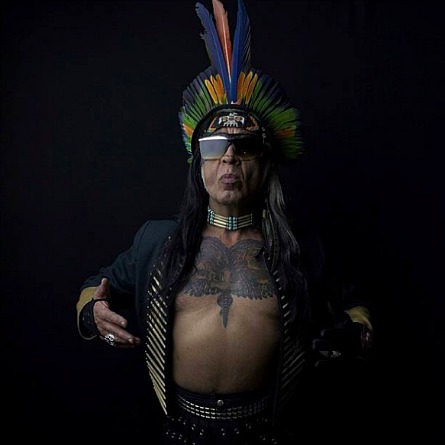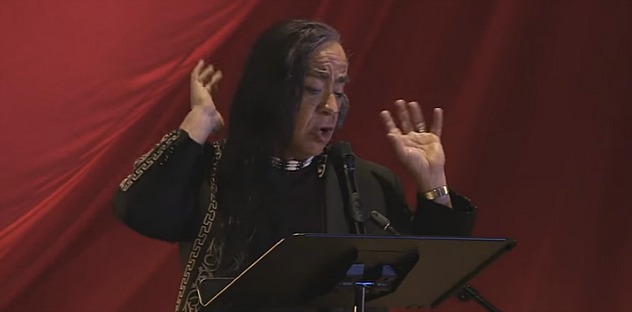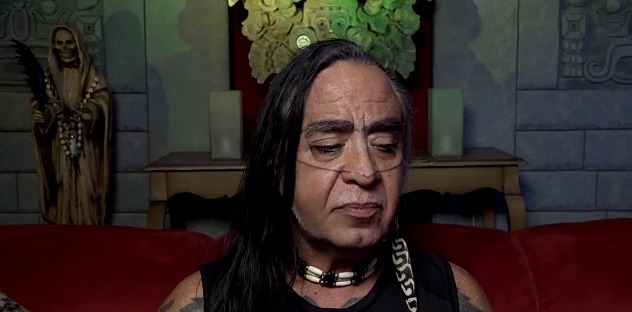La Pocha Nostra
La Pocha Nostra is a trans-disciplinary arts organization that provides a support network and forum for artists of various disciplines, generations and ethnic backgrounds. La Pocha is devoted to erasing the borders between art and politics, art practice and theory, artist and spectator. La Pocha Nostra has intensely focused on the notion of collaboration across national borders, race, gender and generations as an act of radical citizen diplomacy and as a means to create “ephemeral communities” of rebel artists.
A user-friendly guide to getting to know La Pocha Nostra Online.
Connecticut College news story on La Pocha Nostra's Residency, February 27 - 28, 2017
Monday, February 27, 2017, 4:30 p.m.

Palmer Auditorium
"Unplugged"
A brand new spoken word monologue by el Mad Mex
The rebel artist @ 60 faces his inner demons uncensored and wilder than ever.
Artists: Guillermo Gómez Peña and Balitronica
Performance from 4:30 - 5:30 p.m.
Free, open to the public.
Related Fields: Live art laboratory, border performance art, spoken word intellectualism, radical pedagogy
Residency co-sponsored by The Office of the President; Dean of the College; the Art, Dance, Theater and English Departments; CCSRE; and Gender and Women's Studies.
View and download the UnPlugged La Pocha Nostra poster (pdf)
In his latest solo work, "El border brujo" draws from his 30 year old “living archive” and combines new and classic performance material to present a unique perspective on the immediate future of the Americas. His self styled “imaginary activism” invokes performance art as a form of radical democracy and citizenship. Combining spoken word poetry, activist theory, radical storytelling and language experimentation, Gómez Peña offers critical and humorous commentary about the art world, academia, new technologies, the culture of war and violence in the US, organized crime in Mexico, gender and race politics, and the latest wave of complications surrounding gentrification in the "creative city." Besides his international work with the legendary troupe La Pocha Nostra, he has presented his solo work at museums, universities, galleries and theatres throughout the US, Canada, Europe, Latin America, Australia and South Africa.
Gómez Peña’s unique format reveals to an audience the process of creating, languaging and performing material and this process becomes the actual project. It is precisely in his new solo work where Gómez Peña’s literature, theory, activism, pedagogy and live art come together in a wonderfully strange mix. Gómez Peña has spent many years developing his unique solo style, "a combination of embodied poetry, performance activism and theatricalizations of postcolonial theory." In his ten books, as in his live performances, digital art, videos and photoperformances, he pushes the boundaries still further, exploring what’s left for artists to do in a repressive global culture of censorship, paranoid nationalism and what he terms “the mainstream bizarre.” Gómez Peña examines where this leaves the critical practice of artists who aim to make tactical, performative interventions into our notions of culture, race and sexuality. Most recently he has also been exploring the poetic and activist use of new technologies and social media.
Guillermo Gómez Peña is a performance artist, writer, activist, radical pedagogue and director of the performance troupe La Pocha Nostra. Born in Mexico City, he moved to the US in 1978. His performance work and 11 books have contributed to the debates on cultural & gender diversity, border culture and US-Mexico relations. His art work has been presented at over nine hundred venues across the US, Canada, Latin America, Europe, Russia, South Africa and Australia. A MacArthur Fellow, Bessie and American Book Award winner, he is a regular contributor for newspapers and magazines in the US, Mexico, and Europe and a contributing editor to The Drama Review (NYU-MIT). Gómez-Peña is a Senior Fellow in the Hemispheric Institute of Performance and Politics, a Patron for the London-based Live Art Development Agency and in 2012 he was named Samuel Hoi Fellow by USA Artists. More at www.pochanostra.com.
Balitronica is a performance artist, cyborg poet, and queer sex radical raised on the Tijuana/San Diego border. She studied Literature at San Diego State University under the guidance of Harold Jaffe, Edith Frampton, and Sydney Brown. She then relocated to Paris to study American Expat Literature and lived in a 17th century convent with Dominican nuns. Currently living in San Francisco, she recently earned her MFA in Poetry and Queer Theory at Mills College. Since 2013 she has been collaborating with Guillermo Gómez-Peña and La Pocha Nostra and has developed photo-performance projects with Manuel Vason, Herani Hache, RJ Muna, and Marcos Raya. She is currently working on a book titled “A Brief Conversation With My Psychotherapist” and touring with Gomez-Pena/La Pocha Nostra.
Tuesday, February 28, 2017
Palmer Auditorium
"Exercises for Rebel Artists" (Workshop: Private Event)
Facilitated by Guillermo Gómez Peña and Balitronica
Related Fields: Live art laboratory, border performance art, spoken word intellectualism, radical pedagogy
Workshop description
Since 1993, Gómez-Pena and members of the Pocha Nostra performance troupe have conducted cross-cultural/cross-disciplinary/cross-generational workshops involving performance artists, actors, dancers and students from diverse ethnic communities, generations and artistic backgrounds.
- To feed / stretch emerging artists and inquisitive students, helping them to sharpen and develop their performance and analytical skills in dialogue with like-minded cultural radicals.
- To create temporary communities of rebel artists from different disciplines, ages, ethnic backgrounds, gender persuasions, and nationalities, in which difference and experimentation are not only accepted but encouraged.
- To develop new models for relationships between artists and communities, mentor and apprentice, which are neither colonial nor condescending.
- To find new modes of relating laterally to the 'other' in a less-mediated way, bypassing the myriad borders imposed by our professional institutions, our religious and political beliefs, and pop-cultural affiliations. To experience this, even if only for the duration of the workshop, can have a profound impact in the participant’s future practice.
- To discover new ways of relating to our own bodies. By decolonizing and then re-politicizing our bodies, they can become sites for activism and embodied theory; for memory and reinvention; for pleasure and penance.
- To raise crucial questions: Why do we do what we do? Which borders do we wish to cross and why? Which are the hardest borders to cross both in the workshop and in our personal lives? How do we define our multiple communities, and why do we belong to them? What is the relationship between performance, activism, pedagogy and our everyday lives? What about the relationship between the physical body and the social body?
- To seek a new hybrid and interdisciplinary aesthetic, reflective of the spirit and tribulations of our times, and of the concerns of each participant.
- To empower participants as individuals to become civic-minded artists.
- To make performance art pertinent to a new generation of potential activist-artists. They may eventually have to save us from the very monsters and pitfalls that we, their arrogant forefathers, have either created or allowed to happen.
Workshop materials

